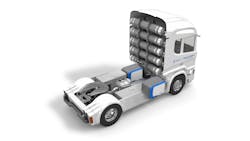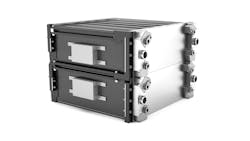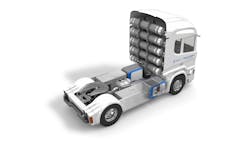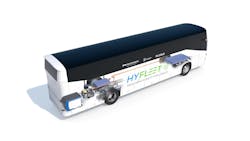Freudenberg and ZF Friedrichshafen AG are collaborating on the development of a fuel cell-based drive system for heavy-duty commercial vehicles. The companies announced on September 15 the signing of a long-term strategic agreement for this technology development.
Freudenberg and ZF plan to develop a fuel cell/battery system which can completely replace diesel engine power systems, and expect the first prototypes to be available by 2023 at the latest. Series production for the hybrid system will begin shortly after.
Both companies are committed to development of alternative energy solutions. ZF has been developing various electrification products for several years now, many of which it showcased at the recent IAA Transportation event.
Freudenberg, best known in the fluid power industry for its seal technology, has worked in the electrification space for several years as well but began supplementing its expertise after the acquisitions of fuel cell manufacturer Elcore in 2018 and battery developer XALT Energy in 2019.
"We are investing heavily in the mobility of the future. In battery, hydrogen and fuel cell technology as well as in the development of high-tech components for electric vehicles. The long-term cooperation with ZF...underscores the strategic importance and growth potential that we at Freudenberg see in this sector," explained Dr. Mohsen Sohi, CEO of the Freudenberg Group, in the company's press release announcing the development partnership.
Combined Expertise Benefits Design
The companies intend to develop a highly integrated hybrid fuel cell/battery drive system as well as the balance-of-plant (BoP) components which enable its use stated Freudenberg in its press release. For this project, Freudenberg will bring its expertise in fuel cells and batteries while ZF will bring its competency in developing drivelines, inverters and other electric components as well as system integration capabilities.
Their development of the hybrid system will benefit from both companies' familiarity with heavy-duty vehicle applications. Both develop solutions for such vehicles and have been involved in various electrification projects in recent years that will lend further expertise to the project. This will help to ensure the fuel cell/battery system meets the performance requirements of commercial vehicles.
Freudenberg noted in its press release that many of the fuel cell systems currently available in the market were originally developed for passenger cars. Heavy-duty commercial vehicles, however, have different requirements such as needing a system which is designed for long service life and the highest possible system efficiency the company stated.
While a car may run about 8,000 hours over its lifetime, Freudenberg said trucks spend at least 35,000 hours on the road which necessitates a higher level of power and other performance requirements.
Although the new system will be developed specifically for use in heavy-duty on-road vehicles, an area in which electrification solutions is expanding due to technology advancements and the need to reduce emissions from this vital industry segment, Freudenberg noted in its press release there could be further application possibilities in the future. These include use in rail, marine and other special vehicle systems such as construction, agriculture and other off-highway equipment — all of which are also seeing expanded emphasis in electrification and other power system alternatives.
READ MORE: Hybrid Electric Powertrains Helping Decarbonize Marine and Offshore Applications
Technology to Meet Industry Requirements
The new hybrid system will feature Freudenberg's fuel cell technology which has a modular design to easily customize it to various application requirements. It also provides easy plug-and-play installation for OEM customers.
According to Freudenberg, it is particularly important to achieve the highest possible overall system efficiency – at nominal load and taking into account the BoP’s energy requirement — which it works to achieve from the start with its fuel cell system designs. The company said its fuel cell experts strive for an overall efficiency of 50%. This ensures efficient powertrain performance which reduces fuel consumption and total cost of ownership (TCO), vital factors for commercial vehicles as they are used for business unlike most passenger cars.
"Our goal is to design the fuel cell battery drive system for a long service life and real-world heavy-duty profiles. This ensures that our customers benefit not only from a sustainable, emission-free solution in heavy-duty transport, it also pays off economically for them throughout the lifetime of the systems," said Dr. Max Kley, CEO of Freudenberg e-Power Systems — the division of Freudenberg Group focused on emission-neutral energy systems — in the company's press release.
Benefiting the project and Freudenberg's fuel cell technology in general is the company's in-house production of gas diffusion layers, permeation-optimized sealing materials and catalysts. These help to form the basis for a fully integrated membrane-electrode assembly (MEA) and help provide a commercial and technical competitive edge said Freudenberg in its press release.
"We have the complete technological understanding of the functionally critical components in-house, ranging from the raw material to the finished system," noted Kley. "The combination of our comprehensive fuel cell expertise and our over 25 years of experience in the large-scale industrialization of the essential components enables us to play a key role in shaping the development of an entire industry in the direction of emission-free mobility."
Development partnerships such as this are becoming increasingly more common to help advance electrification and other alternative energy solutions. By bringing industry expertise together, there can be faster creation of new technologies and time to market. Not every company has the knowledge necessary to develop these new electric power systems but partnering with others who have that expertise it can becomes easier to design and integrate such systems.
As ZF said it in its press release announcing the partnership, there can also be creation of a one-stop-shop solution for OEMs, another growing industry trend as many customers today want a full system solution not just a single product.
"Decarbonization is a major aim of the transport industry, and within this, fuel cell technology will be a game changer. Together with Freudenberg, we can offer a ‘one-stop-shop' solution enabling manufacturers to quickly bring e-mobility solutions to market and support the industry's transformation towards a more sustainable future," said Wilhelm Rehm, ZF Board Member with responsibility for Commercial Vehicle Solutions, Industrial Technology and Materials Management, in the company's press release. "By reducing manufacturers’ development and project costs, our powerpack solutions will also help to lower the Total Cost of Ownership."
READ MORE: Electric Vehicle Development to Grow Over Next Decade
Like many companies, ZF and Freudenberg see the benefit of developing a variety of power source options such as fuel cell as well as battery technology. Most agree, particularly in heavier duty applications, that a range of alternative energy options will be necessary to meet both emissions reduction and industry requirements.
Hydrogen fuel cells are seen as a better option for many heavy-duty applications because of the better range and refueling times possible. ZF said it estimates the worldwide share for fuel cell commercial vehicles will reach 20% by 2030 which is why it is developing technology that will work with these as well as battery-electric power systems.
About the Author
Sara Jensen
Executive Editor, Power & Motion
Sara Jensen is executive editor of Power & Motion, directing expanded coverage into the modern fluid power space, as well as mechatronic and smart technologies. She has over 15 years of publishing experience. Prior to Power & Motion she spent 11 years with a trade publication for engineers of heavy-duty equipment, the last 3 of which were as the editor and brand lead. Over the course of her time in the B2B industry, Sara has gained an extensive knowledge of various heavy-duty equipment industries — including construction, agriculture, mining and on-road trucks —along with the systems and market trends which impact them such as fluid power and electronic motion control technologies.
You can follow Sara and Power & Motion via the following social media handles:
X (formerly Twitter): @TechnlgyEditor and @PowerMotionTech
LinkedIn: @SaraJensen and @Power&Motion
Facebook: @PowerMotionTech

Leaders relevant to this article:




